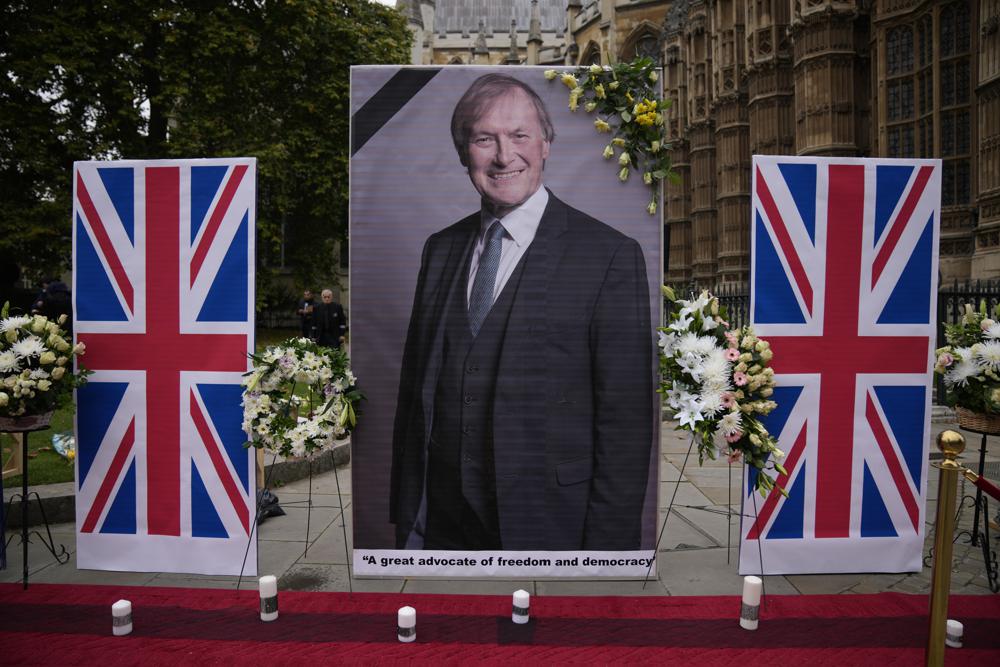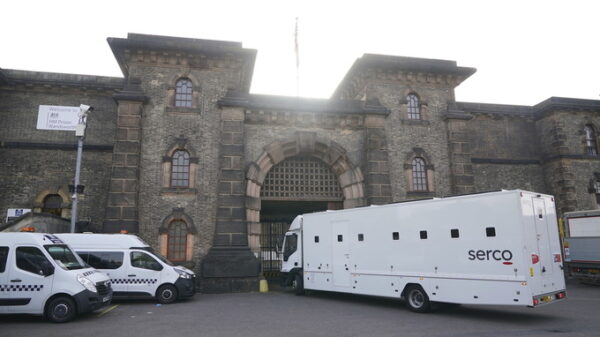An image of British Member of Parliament David Amess is displayed opposite the Houses of Parliament in London, placed there as a memorial by supporters of the National Council of Resistance of Iran (NCRI), Monday, Oct. 18, 2021. British lawmaker David Amess was killed on Friday during a meeting with constituents at the Belfairs Methodist church, in Leigh-on-Sea, Essex, England. (AP Photo/Matt Dunham)
LONDON (AP) — British Prime Minister Boris Johnson will lead a special session of Parliament on Monday to honor the Conservative lawmaker stabbed to death as he met constituents, an attack that has raised questions about how the country protects it politicians and grapples with extremism at home.
The tributes from shaken and grieving colleagues will come as detectives try to determine whether David Amess was targeted simply because he was a legislator, or for more individual reasons.
A 25-year-old British man with Somali heritage, Ali Harbi Ali, was arrested at the scene of the attack and is being held under the Terrorism Act on suspicion of murder. Police say the suspect appears to have acted alone and may have had a “motivation linked to Islamist extremism.”
The death of the popular legislator who had served in Parliament for almost 40 years shocked Britain, especially its politicians. It came five years after Labour Party lawmaker Jo Cox was shot and stabbed to death by a far-right extremist. Cox was the first British lawmaker to be killed since a peace accord ended large-scale Northern Ireland violence almost 30 years earlier.
The House of Commons returns Monday from a three-week break, and most of the scheduled business has been replaced by tributes to Amess. That will be followed by a service at the medieval St. Margaret’s Church in the shadow of Parliament.
The government has ordered a review of lawmakers’ security following the attack on Friday. British politicians are protected by armed police when they are in Parliament but generally are not given such protection when they meet with constituents in the districts they represent.
That is despite the fact that many politicians say the amount of abuse they receive, both online and in person, has soared in recent years. Police in Wales said Monday they had arrested a 76-year-old man on suspicion of sending a death threat to Labour lawmaker Chris Bryant, the latest in a string of threats to politicians.
Bryant said the tenor of politics was “more sour now than I’ve known it in 20 years.”
Nick Thomas-Symonds, crime and policing spokesman for the main opposition Labour Party, said he and many other politicians received “intimidation while out on the streets, death threats, terrible letters, awful emails.”
“I don’t know a member of Parliament who has not suffered in that way,” he told the BBC. “It’s clear that something now has to change.”
While many politicians fear for their safety, most also resist putting more barriers between themselves and the public in a country with a tradition of particular openness and where lawmakers regularly hold open meetings with those they represent. Johnson’s spokesman, Max Blain, said that security would be reviewed, but “this attack cannot get in the way of democracy.”
“We will not be cowed by those who seek to divide us and spread hate and the PM has been struck by the bravery and commitment to serving constituents expressed by many MPs following Sir David’s death,” he said
The killing has also renewed debate about the threat from people radicalized by Islamic extremist or far-right ideology.
Multiple media outlets have reported that the suspect was referred several years go to a government-sponsored program designed to steer people away from extremism, but was not considered a current subject of interest by the security services.
Ali comes from a family prominent in politics in Somalia. His father, Harbi Ali Kullane, a former adviser to Somalia’s prime minister, told the Sunday Times he was “traumatized” by the attack and his son’s arrest.
Police have until Friday to question the suspect, and are working to determine what, if any, connection he had to Amess and why he targeted the lawmaker. The politician’s meeting with voters in the seaside town of Leigh-on-Sea was public and open to all.
Amess was a social conservative who opposed abortion, campaigned for animal rights and strongly supported Britain’s exit from the European Union. He also was chairman of the All-Party Parliamentary British-Qatar Group, which aims to build ties between the two countries, and visited the Gulf state just days before he was killed.
U.K. investigators so far have not found any evidence that the link to Qatar is significant.
Amess’ family said in a statement that they were struggling to comprehend what had happened.
“We ask people to set aside their differences and show kindness and love to all,” said the politician’s wife, Julia Amess, and their five children. “This is the only way forward. Set aside hatred and work towards togetherness.”
Copyright 2021 Associated Press. All rights reserved.








































